国籍のない子供とは?
この風刺画について
この風刺画は、「国籍のない子供(Child without nationality)」というテーマで描いた作品です。
国や文化、言語、宗教が異なる多くの子供たちが、それぞれの国旗を掲げて楽しそうに集まる中で、真ん中に立つ一人の子供だけが、真っ白な布を持って立っている姿が描かれています。
この白い布は、どの国にも属していない、つまり「国籍を持たない」ことを象徴しています。
子供たちは世界中から集まっており、背景には日本やアメリカ、イギリス、フランス、ドイツ、ナイジェリア、ブラジルなど、さまざまな国の国旗が見えます。
それに対して、中央の子供たちはあえて無国籍で描かれており、周囲の子供たちと対比的な存在です。
全体としては明るく楽しげな雰囲気でありながらも、その中に孤立感やアイデンティティの喪失、社会からの取り残され感といった、現代社会が抱える深刻な課題を込めました。
この作品は、見た目には一見可愛らしく、親しみやすい絵柄で構成していますが、裏には重たいテーマが存在します。
世界には国籍を持てず、教育や医療を受ける権利さえ制限される子供たちがいます。
彼らは戦争、迫害、制度的欠陥など様々な理由で「どこの国の子でもない」という立場に置かれています。その現実を、視覚的に直感的に伝えたくて、このような構成にしました。
風刺画のポイント
この風刺画を描くにあたって、特に意識したポイントは「ギャップの演出」と「普遍的な訴求力」です。
まず、子供たちをあえてカラフルで笑顔いっぱいに描くことで、「子供=希望」というイメージを前面に出しました。
その一方で、無国籍の子供たちは白い布だけを持ち、表情もどこか寂しげです。この対比により、彼らが取り残されているという現実を視覚的に強調しています。
また、無国籍の子供は決して一人ではなく、それぞれ異なる文化や背景を感じさせる3人を描いています。
これは「国籍のない子供」という問題が、特定の国や民族だけでなく、全世界的な問題であることを象徴しています。
中央の子供たちに着せた服や肌の色も意図的にバラバラにしています。宗教的な象徴を含む服装(ヒジャブや民族衣装)を取り入れたのも、彼らが属するアイデンティティは確かに存在しているのに、法的な「国」という枠組みには属せていないという矛盾を強調したかったからです。
もう一つのポイントは「白い布」の意味です。
これは無所属であることの象徴であり、同時に「キャンバス」としての可能性も含んでいます。
この子供たちはまだ真っ白な未来を持っており、社会が手を差し伸べることで、希望ある未来を描けるというメッセージを込めました。白は空虚を意味する一方で、始まりの色でもあります。
私自身がこのテーマを選んだ理由は、国際ニュースや難民問題を日々目にする中で、「子供」という存在が最も無力である一方、最も希望の象徴であると感じたからです。
日本語と英語の両方でメッセージを記載したのも、国内外の人に広く届けたいという思いからです。
文字フォントや色合いにも工夫を加え、真面目なテーマでありながらも、視覚的な興味を惹くように設計しました。
この作品が、少しでも現代の無国籍問題に関心を持つきっかけになれば幸いです。
私たち一人ひとりが「どこにも属せない子供たち」を意識することで、世界は少しずつ変わっていくと信じています。
AIが描いた「国籍のない子供」
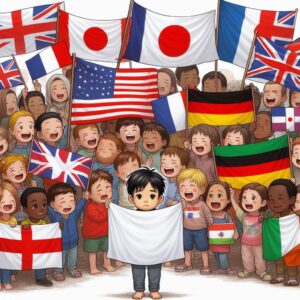 |
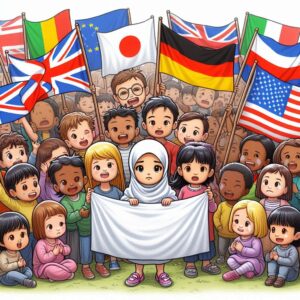 |
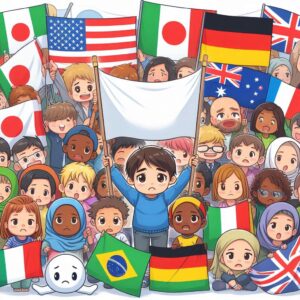 |
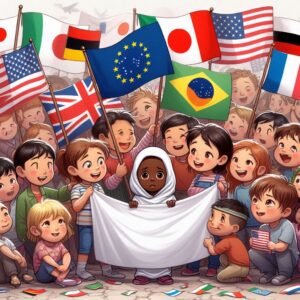 |
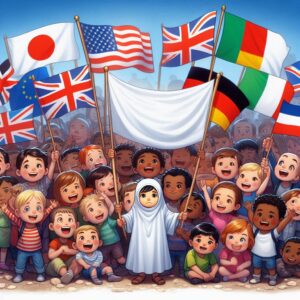 |
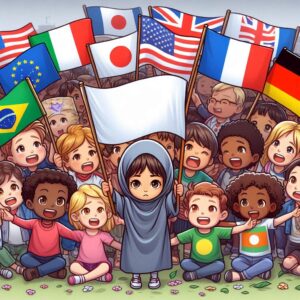 |
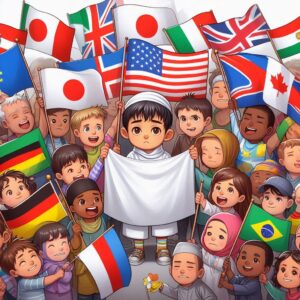 |

コメント